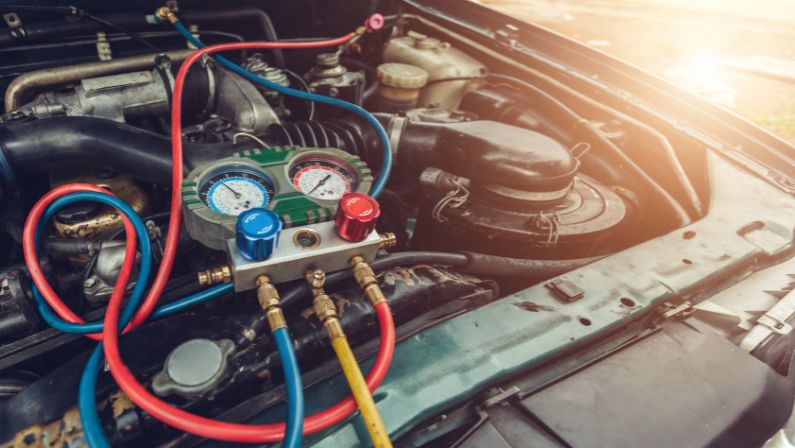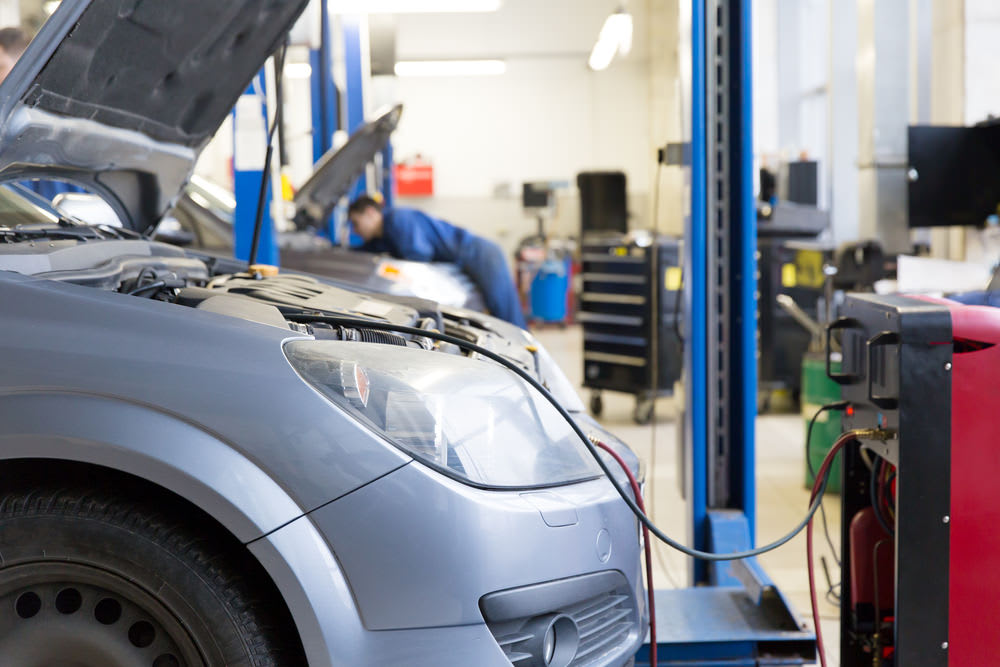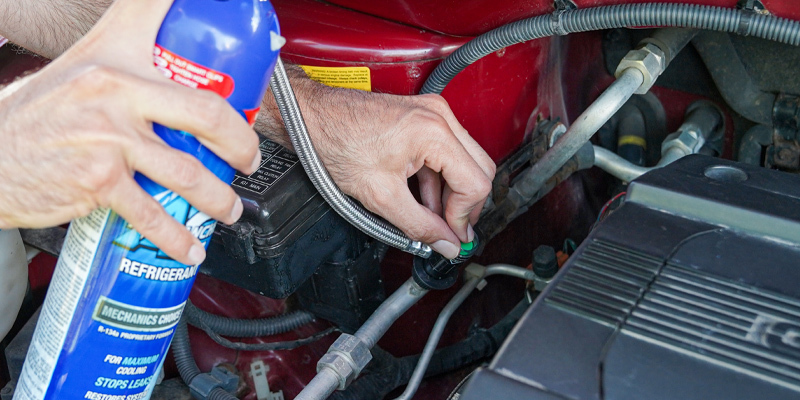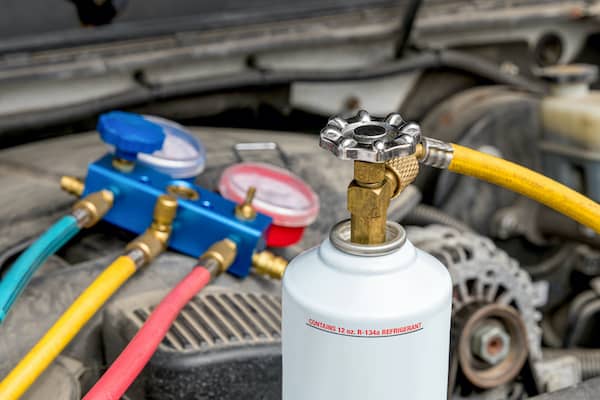Car AC typically needs to be recharged every 1-2 years, depending on usage and system condition. Proper maintenance can also extend the time between recharges.
Maintaining your car’s AC system is crucial for ensuring its optimal performance and longevity. Regular usage and environmental factors can contribute to the gradual loss of refrigerant, resulting in less effective cooling. By understanding the signs of a low refrigerant level and scheduling routine maintenance, you can effectively prevent any potential issues.
Properly maintaining your car’s AC will not only keep you comfortable during your drives but also help you avoid costly repairs in the long run. We’ll explore the frequency of car AC recharging, signs of a low refrigerant level, and essential maintenance tips to keep your AC system running smoothly.

Credit: aquashinecarwash.com
Importance Of Car Ac Maintenance
Maintaining your car’s air conditioning (AC) system is crucial in ensuring comfortable rides, especially during scorching summer months. Regular maintenance not only keeps you cool but also extends the lifespan of your AC, preventing costly repairs down the line. By understanding the signs of low refrigerant levels and the effects it has on your AC’s performance, you can timely recharge it and maintain optimal coolness in your car.
Signs Of Low Refrigerant Levels
It is important to be able to recognize the signs that your car’s AC system might be running low on refrigerant. Some common indications include:
- Warm air blowing through the vents when the AC is turned on.
- Reduced cooling efficiency, resulting in insufficient cooling even at maximum settings.
- Unusual noises, such as squealing or grinding, coming from the AC unit.
- Foul odor, indicating mold or mildew growth in the AC system.
- Visible leaks or frost on the AC components.
Effects Of Low Refrigerant Levels On Ac Performance
When your car’s AC lacks sufficient refrigerant, it can significantly affect its performance. The effects of low refrigerant levels include:
- Reduced cooling capacity, making it difficult to maintain a comfortable temperature inside the car.
- Increased strain on the AC compressor, potentially leading to mechanical failures and expensive repairs.
- Imbalanced pressure levels, causing improper circulation of refrigerant and hampering overall cooling efficiency.
- Accelerated wear and tear on AC components due to increased workload.
- Deterioration of air quality inside the cabin, as the AC system is unable to filter out pollutants effectively.
If you notice any of these signs or suspect low refrigerant levels, it is essential to recharge your car’s AC promptly. Regular maintenance and recharging will not only ensure a cooler and more comfortable driving experience but also extend the lifespan of your AC system.
Frequency Of Car Ac Recharging
One of the common concerns for car owners is the frequency at which their car’s AC system needs to be recharged. Understanding the factors determining recharge frequency and the typical timeframe between recharges can help you ensure your AC system functions optimally and keeps you comfortable during your drives.
Factors Determining Recharge Frequency
Several factors affect how often a car’s AC system needs recharging, including:
- Usage: Frequent use of the AC system can lead to more rapid refrigerant depletion, necessitating more frequent recharges.
- Leakage: Refrigerant leaks in the system can result in the need for more frequent recharges.
- Age and condition: The age and condition of the AC system components can impact the rate of refrigerant loss.
- Environmental factors: Climate and environmental conditions can affect the performance of the AC system and the need for recharging.
Typical Timeframe Between Recharges
The timeframe between car AC recharges can vary depending on the factors mentioned above, but typically, a well-maintained AC system may need recharging every 1 to 2 years. However, it’s essential to monitor the system for signs of decreased cooling efficiency or unusual noises, which may indicate the need for more immediate attention.
Diy Recharging Vs. Professional Service
When it comes to recharging the car’s AC, car owners often find themselves in a dilemma choosing between DIY recharging and seeking professional service. Each approach has its own set of benefits and risks.
Benefits And Risks Of Diy Recharging
DIY recharging may seem convenient and cost-effective. However, without the necessary expertise, it can lead to overcharging or the introduction of contaminants into the system.
- Benefits: Cost-effective option for those with mechanical skills.
- Risks: Potential damage to the AC system if not done correctly.
Advantages Of Professional Recharging Services
Seeking professional AC recharging services ensures that the job is done accurately and efficiently. Professional technicians have the expertise and equipment to diagnose any underlying issues and prevent further damage to the AC system.
- Advantages: Ensures accurate and proper recharging, preventing damage.
- Risks: Higher cost compared to DIY recharging.

Credit: www.yourmechanic.com
Indicators For Ac System Inspection
Ensure regular AC system inspections to determine the recharge frequency. This preventive maintenance improves performance and prolongs the system’s lifespan. Professional evaluation can pinpoint potential issues before they escalate.
Regularly inspecting your car’s AC system is crucial to ensure it functions optimally. By keeping an eye out for specific indicators, you can prevent potential problems and avoid costlier repairs down the road. In this section, we will discuss the signs that determine when it’s time to consider a professional inspection and common AC problems that require immediate attention.
When To Consider Professional Inspection
- Insufficient Cooling: If you notice that your car’s AC isn’t cooling as effectively as it used to, it’s time to consider a professional inspection. This could indicate a refrigerant leak or a malfunctioning compressor.
- Strange Noises: Any unusual noises coming from your AC system, such as grinding, squealing, or rattling, should not be ignored. These sounds might point to a faulty belt, worn-out bearings, or other issues that require professional attention.
- Musty Odors: Foul odors emanating from the AC vents suggest the presence of mold or bacteria inside the system. Such contamination can have adverse effects on air quality and may even contribute to health problems.
- Inconsistent Airflow: If your car’s AC system is providing inconsistent airflow, with weak or no air coming from certain vents, it’s worth having a professional inspect the system. This could be the result of blockages, clogs, or problems with the blower motor.
- Leaking Fluid: Spotting any leaks under your car or noticing moisture inside the cabin could indicate a refrigerant or coolant leak. A professional inspection is crucial to identify and fix the underlying issue.
Common Ac Problems Requiring Attention
- Refrigerant Leaks: Refrigerant leaks not only lead to reduced cooling efficiency but can also cause damage to other components of the AC system. Detecting and repairing leaks promptly is essential to avoid further complications.
- Electrical Issues: Electrical problems can hinder the proper functioning of your car’s AC system. These issues may manifest as intermittent cooling, sudden system shutdowns, or general malfunctioning. It’s important to have a professional diagnose and rectify any electrical faults.
- Compressor Failure: The compressor is the heart of the AC system, and its failure can render the entire system inoperable. Signs of a failing compressor include strange noises, frequent cycling, or lack of cooling. Professional intervention is necessary to determine if compressor replacement or repair is required.
- Clogged or Dirty Components: Over time, debris, dust, and other particles can accumulate within the AC system, leading to clogged or dirty components. This can result in reduced airflow, increased strain on the system, and decreased cooling performance. Regular maintenance and cleaning can prevent these issues.
- Faulty Blower Motor: A malfunctioning blower motor can disrupt the airflow within your car’s AC system, causing inadequate cooling or no air at all. Professional inspection and repair are necessary to address blower motor problems, including issues with the motor itself or related components.
Preventive Measures For Maintaining Car Ac
When it comes to preventing costly repairs, maintaining your car’s AC system is essential. Regular maintenance ensures optimal performance and prevents the need for frequent recharges.
Regular Maintenance Tips:
- Change your AC filters every 6 months.
- Inspect for leaks and get them fixed promptly.
- Clean the condenser and evaporator coils annually.
- Have the refrigerant level checked regularly.
Long-term Benefits Of Proper Ac Care:
- Increased longevity of your AC system.
- Improved cooling efficiency for a comfortable ride.
- Prevention of major breakdowns, saving you money.

Credit: www.aireserv.com
Frequently Asked Questions On How Often Does Car Ac Need To Be Recharged
How Long Does An Ac Recharge Last In A Car?
On average, a car AC recharge can last for about 1-2 years. However, this can vary depending on factors such as system leaks or component wear. Getting regular maintenance can help extend the recharge’s lifespan.
How Do You Know If Your Car Ac Needs Recharged?
You’ll notice warm air, weak airflow, strange odors or unusual noises from the AC. Reduced cooling performance indicates a need for recharge. Keep an eye on these signs and consult a professional if needed.
How Much Does It Cost To Recharge A Car Air Conditioner?
Recharging a car air conditioner costs between $100 to $350, depending on the type of refrigerant needed.
How Do You Know If Your Car Ac Is Low On Freon?
You can determine if your car AC is low on freon by checking for signs such as weak airflow, warm air, unusual noises, or a noticeable decrease in cooling performance. If you experience any of these issues, it’s advisable to consult a professional to evaluate and recharge your car’s AC system.
Conclusion
The frequency at which your car’s AC needs to be recharged depends on various factors such as the age of the system, the condition of the components, and how frequently you use it. It is crucial to pay attention to any signs of a failing AC, such as decreased cooling or strange noises.
Regular maintenance by a professional can help extend the lifespan of your AC system and ensure it operates smoothly. Keep your car cool and comfortable by addressing any refrigerant leaks and recharging the system as needed.
